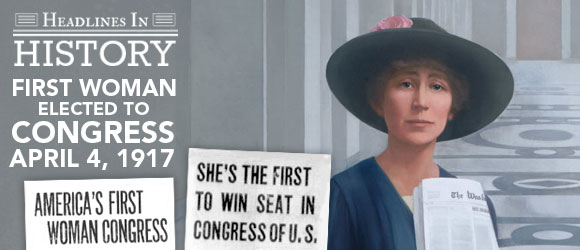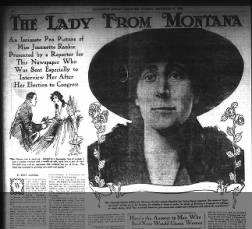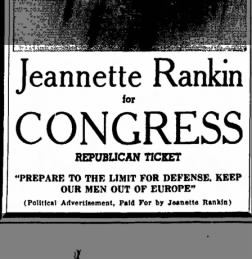

On April 2, 1917, Jeannette Rankin assumed her seat in the House of Representatives, making her the first woman to be elected to Congress.
Rankin was born in Montana in 1880. She graduated from the University of Montana in 1902 and later attended the New York School of Philanthropy (1908–1909), where she studied social work. After a brief time as a social worker in Washington State, she became highly involved in the women’s suffrage movement, particularly in Washington State, Montana, California, and Ohio.
With the financial backing of her brother, Rankin decided to run in the 1916 congressional election (women in Montana had the right to vote by this time). Though some newspapers initially reported that she had been defeated, Rankin won on a Progressive Republican platform that promoted national women’s suffrage, prohibition, child welfare, and pacifism. Just a few days after Rankin took her seat, the House voted on America’s entrance into World War I. Rankin, standing by her pacifist ideals, was one of about 50 members who voted against the war. Rankin served out her two-year term but decided, rather than running for reelection, to run in the Senate race; however, she lost the Republican nomination.

Rankin moved to Georgia and resumed promoting peace and social justice. She eventually returned to Montana, again running for—and winning—a seat in the House of Representatives, this time in the 1940 elections. When Congress voted on entering World War II after Pearl Harbor, Rankin, now in her sixties, voted against war with Japan, the only member of Congress to do so. Her vote caused such an uproar in the House that she escaped to a nearby phone booth until she could get away from the furor.
Though her views on nonintervention were well known, her anti-war vote provoked a major backlash from politicians and newspapers alike, and Rankin declined to run for office again. Until her death in 1973, she spent her time traveling and campaigning for social reform, most visibly pacifism.
Interested in learning more about Jeannette Rankin? There are thousands of articles about her on Newspapers.com. Get started searching here.


Why can I not print this article? I want to use it for the basis of a presentation.
SSQ
Try copying article to Microsoft Word or another word processor and then print it from there.
I am from Montana and she was a disgrace.
Disgrace?? That’s your personal Opinion and Personal PERSPECTIVE. That’s it!!
I’m a Civil & Human Rights activist and from my Perspective and Opinion She was an Admirable Human being
On regards to Pearl harbor WE NOW KNOW that was technically a “False flag” attack since the US Gov and Roosevelt DID KNOW of the impending attack and They DID choose to allow the Attack to take place to piss off the People into going to war. So it WAS OUR GOV GUILTY for Sacrificing every single person that died at Pearl harbor. This woman is the Clear!!! and technically an Angel for her stance and her work.
John, please site your supporting information for this accusation. FDR may have desired that either Japan or Germany make the first move against us, but that’s not to say he had prior knowledge of the attack on Pearl Harbor.
There are some people (apparently you included) who believe this theory, but I have yet to see any definitive evidence. Just because someone makes the charge, that doesn’t make it real. As far as I’m concerned, this ranks right up their with Hillary’s Right Wing Conspiracy.
Prove it!
Nevertheless, the Japanese DID attack Peal Harbor and did kill Americans. Excuses do not render her free from disdain Of fellow Americans. The actions of the Roosevelt administration are a separate issue.
Nevertheless, the Japanese DID attack Peal Harbor and did kill Americans. Excuses do not render her free from disdain Of fellow Americans. The actions of the Roosevelt administration are a separate issue.
Seamus, What concrete evidence can you present for your statement that FDR and others knew of the attack?
If they want to cry all day for a woman in office that’s fine. But the blame will fall on everyone if they believe to elect another Democrate. For the second time.
I am not a civil rights activist, but do enbrace equal and civil rights for all. I am not that familiar with the history of Ms. Rankin, but John C would be correct in stating that FDR and a select few other did know of the eminent Japaneese attack beforehand. They knew of the nations mood to stay out of the WW2 and realized correctly that it would take a dastardly act like the surprise attack to move the nation to war. I would also suggest that the administration did everything they could think of to pricipitate the Japaneese attack. We are very lucky to have only lost less than 4000 lives.
Vietnam was a far greater travesty as were the governments use of our US Marines in the “Bananna Republic Wars” in the early 20th century.
I am not passing judgement on FDR for what he did. Had he not done what he did, the axis powers would have won the WW2 and things would be far different today!
Conspiracy theories make interesting entertainment, but what are the facts on the ground that support this claim?
While I agree that calling Jeanette Rankin a disgrace is probably a bit much, I can sympathize with Robert Edelmann. I think she was saved from the consequences of voting her principles by the majorities that voted for war. In WWI it is at least arguable that absent American’s late entry the combatants would have blundered on until exhaustion forced some kind of truce, likely to be temporary.
As to WWII (held by many to be a result of problems caused by the peace settlements of WWI), it was, to use Wellington’s words “a close run thing.” Contrary to what many (American and British) war movies would have the viewers believe, the Germans came very close to winning. Without US direct participation it is more than likely that they would have won. I don’t think we would have had an easier time dealing with Hitler in control of all of Western Europe than we did with Stalin who controlled only Eastern Europe.
Regardless of the opinions of John C and Steven D Lambert the evidence has long been accepted that FDR did not have foreknowledge of the attack on Pearl Harbor. According to his detractors at the time he acted recklessly by concentrating the Pacific Fleet in Pearl Harbor, though his supporters thought it a bold act. His principal military advisers more concerned about Europe than Japan had urged him to shift some of the fleet to the Atlantic, a time consuming maneuver as the capital ships couldn’t use the Panama Canal. In any event one event that none of the participants could have predicted was that Hitler and Mussolini would declare war on the United States on 11 December. They were not bound to do so under the terms of the Axis pact. As FDR and his military advisers were in agreement that Europe was the more serious concern it allowed them to concentrate there first, something they would have had difficulty doing absent the declarations of war by the two dictators.
Although first published in 1962 Roberta Wohlstetter’s “Pearl Harbor: Warning and Decision” remains the best work on the details of who had what information and when. Unfortunately too many contemporary commentators forget the difficulties of communicating with Hawaii in the 1940s. These are succinctly noted by David M.Kennedy in his “Freedom from Fear.”
Nice presentation but please don’t forget that most folks will never allow facts to interfere with their opinions. In reality the US was moving to a war footing in a defensive manner but a look at FDR’s actions in regard to his economic policies would indicate that he was not planning for the US entry into the war.
Thank you.
Please unsubscribe me. I live in Scotland and American trivia are of no interest to me.
You can unsubscribe by clicking the “unsubscribe” link at the bottom of the email you received. We can’t do it from this blog since we don’t have your email address.
Unsubscribe
You can unsubscribe by clicking the “unsubscribe” link at the bottom of the email you received. We can’t do it from this blog since we don’t have your email address.
I have truly enjoyed this site. Thank you for all the information about Jeannette Rankin. She was a brave soul and I admire her courage, but wholeheartedly disagree with her pacifism. I’ve bookmarked your site and will be subscribing to your Newspaper.
While Rankin was the only descending vote in congress for voting for war in 1941, it was really a “no vote” on principle because she was a pacifist through and through. Deep down she knew this was our only reasonable response, but she rather fancied herself as not wanting to appear hypocritical.
Now, for the “surprise PH attack,” it was really not that much of a surprise. FDR and the powers that be knew that an attack was eminent but specifically where remained a mystery. PH was considered one of the possible targets but not one of high priority based on the intel available at the time. It has never been proven, and the research is exhausting, that the state, war (army), navy departments and the White House knew specifically that Pearl was the target. The major mistake was not including ALL possibilities when the rather obfuscating 27Nov. war warnings was issued by Adm. Stark,CNO and Gen. George Marshall, Chief of Staff. Research thus far shows FDR did NOT know PH was the target but both he and his administration are to blame for short sightedness and malfeasance in dealing with the many decoded Japanese messages which indicated there would be an attack forthcoming somewhere. Then the president allowed the blame to be placed on the Hawaiian commanders, Gen. Short and Adm. Kimmel, who took his place in the poll of public opinion where they were unmercifully excoriated after several PH hearings did nothing to exonerate them.